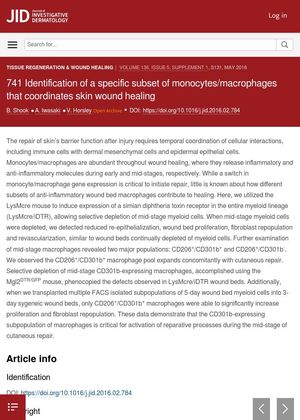Identification of a Specific Subset of Monocytes/Macrophages That Coordinates Skin Wound Healing
April 2016
in “
Journal of Investigative Dermatology
”
monocytes macrophages skin wound healing anti-inflammatory wound bed macrophages LysMcre mouse model re-epithelialization wound bed proliferation fibroblast repopulation revascularization CD206+ CD301b+ cutaneous repair myeloid cells transplanting macrophages skin repair wound healing fibroblast growth blood vessel formation

TLDR A specific type of immune cells, called CD301b-expressing macrophages, are crucial for skin repair processes.
The 2016 study "741 Identification of a specific subset of monocytes/macrophages that coordinates skin wound healing" investigated the role of different subsets of anti-inflammatory wound bed macrophages in skin repair. The researchers used the LysMcre mouse model to selectively deplete mid-stage myeloid cells, which resulted in reduced re-epithelialization, wound bed proliferation, fibroblast repopulation, and revascularization. They identified two major populations of mid-stage macrophages: CD206+/CD301b+ and CD206+/CD301b-. The CD206+/CD301b+ macrophage pool expanded with cutaneous repair. When mid-stage CD301b-expressing macrophages were selectively depleted, the wound beds showed similar defects to those continually depleted of myeloid cells. Transplanting CD206+/CD301b+ macrophages into 3-day sygeneic wound beds significantly increased proliferation and fibroblast repopulation. The study concluded that the CD301b-expressing subpopulation of macrophages is critical for activation of reparative processes during the mid-stage of cutaneous repair.



